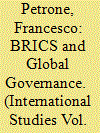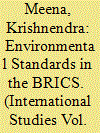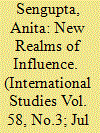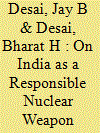|
|
|
Sort Order |
|
|
|
Items / Page
|
|
|
|
|
|
|
| Srl | Item |
| 1 |
ID:
180284


|
|
|
|
|
| Summary/Abstract |
This article analyses the role played by the Brazil, Russia, India, China and South Africa (BRICS) countries within the context of the reform of international institutions, in primis the United Nations Security Council (UNSC). In recent years, the new emerging powers, among which the BRICS occupy a central position, have instigated a paradigm shift in international relations and global governance (GG). Furthermore, some scholars argue that the BRICS could inaugurate a new world order. Since the United Nations (UN) is one of the institutions in which these changes need to be more broadly reflected due to its global projection, it is doubtful if the BRICS will be able to bring about its reform. In fact, several debates were conducted about the need to reform the UN and, in particular, the Security Council (SC). In order to do this, the article examines the interests of the BRICS countries, within the group itself, and their vision for the UNSC. Only a common vision within the group could have specific effects in reforming the UNSC, thus giving a new shape to GG, which may not be possible. There are several obstacles from within the BRICS itself in this regard, despite the fact that during their summits, they have repeatedly called for the UN reforms.
|
|
|
|
|
|
|
|
|
|
|
|
|
|
|
|
| 2 |
ID:
180280


|
|
|
|
|
| Summary/Abstract |
This article explores the reasons for adopting a particular interpretation of national identity and the dynamics of external and internal forces in determining a nation’s ‘ethical history’. The main analysis introduces conceptual innovations related to the problem of ethical cognition through which national identity is being determined based on cognitively unclarified determinants—in this study referred to as the EDCUD paradox. In this regard, the process of ethicization of national identity and the paradox of ethical cognition that emerges in the pursuit of its understanding has been identified as one of the main reasons behind the misuse of national identity in international relations. With that in mind, this study has attempted to create a theoretical setting that would help the analysis of individual cases of national identity in further research.
|
|
|
|
|
|
|
|
|
|
|
|
|
|
|
|
| 3 |
ID:
180286


|
|
|
|
|
| Summary/Abstract |
Since its inception, the BRICS has received attention as a geopolitical challenger to the already established institutions of the Global North. BRICS members have also been vocal on issues concerning global environment. Brazil, India, China and South Africa have raised important issues at international conferences on Climate Change. The article looks at the specific issue of vehicular pollution in the BRICS countries. Vehicular pollution standards already in existence through the United Nations Environment Programme and the most cited and practised standards of the European Union remain the yardstick to be followed around the world. The article looks at the standards set up by the individual BRICS countries. Subsequently efforts of the BRICS as a group are explored through their joint statements. The article argues that despite important players in global vehicle market, the BRICS as a grouping has not been able to formulate any viable alternative standards for vehicular emissions.
|
|
|
|
|
|
|
|
|
|
|
|
|
|
|
|
| 4 |
ID:
180285


|
|
|
|
|
| Summary/Abstract |
This article attempts to understand the emergence of the idea of homeland security in the US in the recent past, the attendant security praxis, and its impact on the Third World security (predicament). It maps the journey of the idea of homeland security—from a US-specific domestic policy framework to a globalizing security framework. It is argued that in the emerging security understanding, the concerns of Third World countries, which were getting some global attention in the past few decades through the concepts like human security and societal security, have been marginalized. By referring to security-related policy changes in other countries, the article explains the US efforts to export this new understanding of security to the Third World and its long-term implications. As the homeland security paradigm and practices make their way into many developing countries, understanding the ‘homeland security moment’ from the perspective of the latter is of crucial significance to gauge their security predicament in the newer context.
|
|
|
|
|
|
|
|
|
|
|
|
|
|
|
|
| 5 |
ID:
180281


|
|
|
|
|
| Summary/Abstract |
The European Union (EU)–Turkey deal consolidated a shift in the EU’s migration policy. The deal is the culmination of the dominance of the security frame and depicts the continuous externalization of the EU’s responsibility of asylum protection and burden sharing. The strengthening of the security frame has weakened the humanitarian norms that previously dictated EU’s behaviour. This has led to the EU losing some of its comparative advantages in negotiations. Simultaneously, the instrumentalization of the value of asylum, paired with an increased number of asylum seekers, has given negotiation leverage to the neighbouring countries turned service providers. These changes in perception and norms have created a power shift, at the disadvantage of the EU, creating a more leveled playing field for negotiations between the parties. This article tracks the historical shifts in the global refugee regime to explain how today’s situation was created. Hereby, the existence of two competing cognitive frames—humanitarian and security—is assumed, tracked and analysed. While looking at the EU–Turkey deal, the article shows that the EU has started treating refugees as a security problem rather than a humanitarian issue, breaking the normative fabric of the refugee regime in the process. The article also displays how Turkey was able to capitalise on this new reality and engage with negotiations of other neighbouring countries of EU that point towards a change of dynamics in the global refugee regime.
|
|
|
|
|
|
|
|
|
|
|
|
|
|
|
|
| 6 |
ID:
180282


|
|
|
|
|
| Summary/Abstract |
The renewed emphasis on Asia’s connectivity infrastructure has brought into focus the complex relationship between pursuing economic development through trans-state linkages and promoting political agendas. The formalizing of transit flows across the Asian space has involved financial, technical and regulatory relations bringing together the interests of actors at various levels. This article examines how these have been used by China to create new realms of influence through a study of the working of the Asian Infrastructure Investment Bank and Chinese markets across Central Asia, in order to demonstrate the complex role that these play in determining the contours of a relationship based on infrastructural financing and trade. The extent to which these globalized corridors and systems of governance might be impacted by the pandemic, however, remains to be seen.
|
|
|
|
|
|
|
|
|
|
|
|
|
|
|
|
| 7 |
ID:
180283


|
|
|
|
|
| Summary/Abstract |
India conducted Operation Shakti (Pokhran II) nuclear tests during 11–13 May 1998 that ushered her into the cherished nuclear weapons club. It was well calibrated decision to formally choose the nuclear path through the first peaceful nuclear explosion, Smiling Buddha (Pokhran I) that was conducted on 18 May 1974. It was significant that without joining the 1968 Nuclear Non-proliferation Treaty, India managed to gatecrash into the nuclear weapons capability. It led to articulation of the No First Use (NFU) doctrine on 4 January 2003 (Ministry of External Affairs [MEA], 2003). In the wake of 16 August 2019 pronouncement of the Indian Defence Minister on possible review of the NFU, this article seeks to probe the question: Does the NFU doctrine require any such review? It comprises the rational, the promise of NFU, counterforce strategies, NFU with respect to tactical nuclear weapons and associated problems with First Use and NFU.
|
|
|
|
|
|
|
|
|
|
|
|
|
|
|
|
|
|
|
|
|